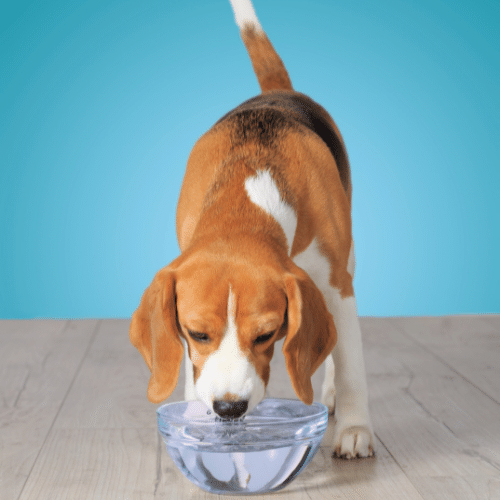Introduction
As responsible pet owners, maintaining our furry companions’ health and well-being is paramount. Hydration plays a crucial role in a dog’s overall health, regulating body temperature, transporting nutrients, and removing waste products. However, there may be times when our canine friends refuse to drink water, leaving us worried and searching for solutions to quench their thirst. In this article, we will explore the causes behind water refusal in dogs and provide practical methods to effectively hydrate them. Understanding the signs and causes of dehydration is essential to ensuring that your beloved pet receives the necessary care.

Image: maudstyles.blogspot.com
Signs and Causes of Dehydration in Dogs
Spotting the signs of dehydration in dogs is crucial to promptly addressing the underlying causes. Some common observable symptoms include:
- Lethargia or weakness
- Loss of appetite
- Sunken eyes
- Dry gums and tongue
- Reduced skin elasticity
Understanding the reasons behind your dog’s water refusal can help you address the issue effectively. Here are a few potential causes:
- Illness: Various medical conditions, such as kidney disease, diabetes, and infections, can cause dogs to drink excessively or refuse water altogether.
- Medications: Certain medications, like diuretics and steroids, can increase urination, leading to dehydration.
- Taste Aversion: If your dog’s water bowl has a peculiar taste or smell, they may avoid drinking from it.
- Dental Issues: Painful dental conditions can make drinking uncomfortable, leading to decreased water intake.
- Stress or Anxiety: When dogs experience stress or anxiety, they may not drink as much as they need.
Quick Hydration Methods for Dogs that Won’t Drink Water
If your dog is refusing to drink water, finding alternative ways to hydrate them becomes imperative. Here are some quick methods:
- Oral Syringe: Gently administer water directly into your dog’s mouth using an oral syringe.
- Chicken or Beef Broth: Offer unsalted chicken or beef broth, which is enticing and contains electrolytes.
- Coconut Water: Coconut water is an excellent source of electrolytes and has a slightly sweet taste that many dogs enjoy.
- Pedialyte: Pedialyte is an over-the-counter electrolyte solution formulated for children but can also be used for dogs in small amounts.
- Ice Cubes: Provide your dog with ice cubes to lick on. As they melt, the water will be absorbed.
Preventing Dehydration in Dogs
Proactive measures can be taken to prevent dehydration in dogs. Here are some tips:
- Provide Fresh Water: Ensure your dog always has access to clean, fresh water in multiple locations throughout the day.
- Add Flavor: Consider adding a small amount of low-sodium chicken or beef broth to your dog’s water bowl to enhance its palatability.
- Cool Down: During hot weather, provide your dog with ample shade and cool water to prevent overheating.
- Monitor Water Intake: Keep an eye on your dog’s water intake, especially during periods of increased activity or hot weather.
- Regular Check-ups: Schedule regular veterinary check-ups to detect any underlying medical conditions that may contribute to dehydration.

Image: www.lovetoknowpets.com
How To Hydrate A Dog That Won’T Drink Water
Conclusion
Dehydration can pose a serious threat to your dog’s health. By understanding the signs and causes of water refusal and implementing effective hydration methods, you can ensure that your furry companion receives the nourishment and care they need to thrive. Preventing dehydration is equally important, and following the preventive measures outlined in this article can help you keep your dog hydrated and healthy. If your dog continues to refuse water despite implementing these measures, it’s crucial to seek veterinary attention promptly to rule out any underlying medical conditions. Prioritizing your dog’s hydration is essential for their overall well-being and longevity.

/GettyImages-1303637-two-way-mirror-57126b585f9b588cc2ed8a7b-5b8ef296c9e77c0050809a9a.jpg?w=740&resize=740,414&ssl=1)



